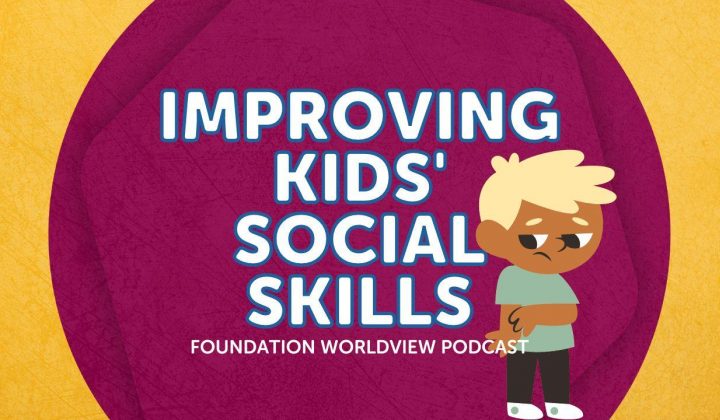Learn more about the journey that led to us equipping kids to carefully evaluate every idea they encounter.
Meet members of our team who have contributed to curriculum development.
Hear from real users of the Foundation Curriculum.
Learn what we believe about God, Jesus, Scripture, and more.
Discerning Appropriate Humor
In this episode of the Foundation Worldview podcast, host Elizabeth Urbanowicz discusses how to discuss humor with children. Listen as she provides biblical principles to guide children in discerning appropriate humor, such as understanding that laughter and humor are good gifts from God, recognizing that humor has its proper place, and ensuring that humor and laughter always honor God. She also encourages parents to be mindful of the entertainment they engage in and to teach their children to turn off shows or avoid humor that does not honor God.
Transcript
Note: The following is an auto-transcript of the podcast recording.
Hello friends, and welcome to another episode of the Foundation Worldview Podcast where we seek to answer your questions so that you can equip the children that God has placed in your care to carefully evaluate every idea they encounter and understand the truth of the biblical worldview. I'm your host, Elizabeth Urbanowicz, and I'm thrilled that you've joined me for another episode today. Today's question says, "how does one discuss humor with kids? It's one thing to tell them a statement is wrong, but how do I explain that some humor should not be laughed at." Really good question and important one for us to think through.
Now before we dive down deep into answering this question, if you have a question that you would like for me to answer on a future Foundation Worldview podcast, you can submit that by going to FoundationWorldview.com/podcast. Also ask that you would just take the few second investment to tap on the stars to rate this podcast. Doing so really just helps spread the word about the Foundation Worldview podcast so that we can equip even more adults to get their kids thinking critically.
Now, thinking about the topic of humor is so important because we know that there's some humor that honors God and then there's some humor that does not, and how do we help our children discern the difference between the two? Now, before we look at how we do this, I think the first thing that's important to do is just get a definition in our mind to know, okay, what are these terms that we're talking about? So I did a quick search online for Merriam-Webster's definition of humor, and this is the definition that popped up. Humor is the quality of being amusing or comic, especially as expressed in literature or speech. Okay? So it's this quality of being amusing or comic, especially as expressed in literature or speech. So it can be written or it can be spoken. And we know that most humor today is either presented in just everyday conversations or it can be presented on memes, on social media, just in different shows or videos that we watch. Lots of different things are presented as being either amusing or comic. So I think there's a few general biblical principles to cover with our kids to get them thinking about humor.
Now, the first biblical principle that I think we should cover is that laughter and humor are good gifts from God that should be enjoyed as such. Proverbs 17:22 says, "A joyful heart is good medicine, but a crushed spirit dries up the bones." And so we want our kids to understand that God is the God of laughter. God invented laughter, and so it's a gift from God. It's something to be enjoyed as a gift from God. And we can even then discuss with our children what are ways in which we as a family have enjoyed humor in the past. You can talk about maybe joke books that you've read or funny things that you've seen on a show or heard in a song or read in a book or maybe funny conversations that you've had around the dinner table.
I know that right now as I record this podcast, I have three nephews and three nieces between my brother's family and my sister's family and my second oldest nephew. He loves humor and we knew that he loved humor even before he turned one, that he just loved doing things that would make people laugh. And this nephew just recently turned five years old and for his birthday, he got tons of joke books. He loves dinosaurs and he loves humor. So he got a lot of different dinosaur joke books and he just loves sitting down and reading those jokes with others and laughing. And when I think about him and I think about his laughter and the way that he just loves those joke books, I think that's just such a clear picture of the good gift of humor that God has given us. And we want our kids to know that God is the author of humor and laughter, that he designed them to be good things and they can be enjoyed as good gifts from him.
The second biblical principle that I think we need to cover is that humor and laughter have their proper place, yet at times they are not appropriate. And we see this very clearly in the third chapter of the book of Ecclesiastes. I'm going to read for us Ecclesiastes chapter three verses one and then verse four. And so Ecclesiastes three verses one and four says "For everything there is a season and a time for every matter under heaven... a time to weep and a time to laugh, a time to mourn and a time to dance." That this wisdom in Ecclesiastes is just reminding us that different things have their proper place, that there's a time for laughter, and then there's a time for weeping. And those two times shouldn't be confused. There's a time for mourning. And then there's a time for dancing with joy. And so this is something we want to talk about with our kids. What are times when humor is appropriate and what are times when humor is not appropriate? When is it a good time to read a joke or to tell a joke? When are good times to laugh? And then when are times when it's not appropriate?
And these are things that I would try to help my students understand when I was teaching. As a teacher, I found that humor was an easy way to smooth things over when there was a difficult situation in the classroom. That one year I had a little boy in my class who was just this precious little boy and he was on the autism spectrum. He had Asperger's syndrome. And so sometimes because of his Asperger's, when he would get his mind fixated on something, he had a hard time switching gears. And so he would frequently get upset over just little bumps in the road. And I found that when I tried to reason with him, reason him out of these big emotions that didn't work, where if I used humor that that would easily get him into the right frame of mind.
One day he came up to me and he was like, miss you, miss you. I lost my pencil. I lost my pencil. I can't do my work. And with another student, I would've just said, here's another pencil. Go back to your seat. Do your work. Where with him, he couldn't get over that the fact that his pencil was lost. So what I did is rather than just try to talk him out of it, I said, oh my goodness, your pencil is lost. This is the worst thing that possibly could have happened to you. This is the worst thing that could happen in the world. Oh my goodness, your pencil is lost. I think I'm going to have to send you back to second grade. You can't be in third grade now because you don't have your pencil and you can't do your work, and this is the worst possible thing that could have happened. And he looked at me and he smiled and he said, oh, miss you, it's not that big a deal. And I said, you're right, buddy. It's not that big a deal. And I gave him a pencil off my desk. I said, here you go. Here's another pencil. You can go finish your work.
And so in that situation, humor was completely appropriate because it helped refocus his mind. It gave him just a little chuckle. Where then there was other times where students in the class would, in the middle of a lesson, they would try to say something funny that had nothing to do with the lesson, just to try to get everybody laughing and get the attention on themselves. And so that's when I could have to pull them to the side and say, I love that God has given you this gift of laughter. But you know what? Right now you're trying to use that gift to get everybody to pay attention to you rather than paying attention to what we're supposed to be learning. And so what you're doing right now is you're actually sinning against everybody else in the classroom and against me, and ultimately you're sinning against God. And so we want to help our children understand there's a proper place for laughter. And then there's times when what we're laughing at might not be wrong, but the timing of it is not correct.
And so then the third biblical principle that I think that we need to help our kids understand is that our humor and laughter should always be honoring to God. Our humor and our laughter should always be honoring to God. We see this clearly in Ephesians chapter five, Ephesians five, verses one through four says, "Therefore be imitators of God, as beloved children. And walk in love, as Christ loved us and gave himself us, sorry, and gave him himself up for us, a fragrant offering and sacrifice to God. But sexual immorality and all impurity or covetousness must not even be named among you, as is proper among saints. Let there be no filthiness nor foolish talk nor crude joking, which are out of place, but instead let there be thanksgiving." And so this passage just makes clear that we are not to have any filthiness or foolish talk or crude joking that these are things that are out of place for Christians. We are to receive humor as a gift from God that we should be thankful for, but it must be humor that honors God. I heard this statement when I was growing up. I believe it was the pastor at my church growing up. I believe it was his son-in-law who said this one time in our youth group meeting, he said, I refuse to be entertained by anything that crucified my savior. And that's just a statement that has stuck with me and has made me think anytime that I'm laughing at something, am I being entertained by something right now that Jesus bled and died to pay the penalty for that sin? Because I don't want any part of that. If that's the case, as a follower of Jesus, as someone who loves him and who knows that he gave up his very life for me, I do not want to be entertained to find humor in anything that he had to bleed and die for on the cross.
So when something that I think we can do that's very appropriate to help our children understand this, when there is inappropriate humor, when there's humor that doesn't honor God, whether it's with older kids, we're finding humor that just cheapens sex, God's good gift of sex and sexuality, or whether it's just crude joking where people are treating one another in a way that doesn't honor God, but it's meant to get a laugh, or whether it's just potty talk. Those are things that if they're happening on shows that our children are watching, that we need to just train them, that we're just going to turn that off. And the minute that happens that we turn that show off. And why do we do that? Well, because it's humor. It's trying to get us to laugh at things that do not honor God. And that's something we've been commanded against in that verse in Ephesians five, let there be no filthiness nor foolish talk, nor crude joking, which are out of place. So we want to make sure that we're practicing this with our kids, that we're cutting off, we're turning off shows that have humor that does not honor God. Excuse me. I think this is something we as adults need to make sure that we're on the lookout for in our own lives.
And I know when I say this, I'm going to step on some toes here, but as you know, I don't purposely try to step on toes, but I think for the sake of honoring God, toes are worthy of getting stepped on. But even many of the shows that Christians enjoy and view as more clean include humor and jokes that just are about sex and sexuality that just really cheapen it, that make it look like something that's nothing more than a physical act of genital stimulation rather than this good gift that God has given us. And I think we need to be really, really careful in what entertainment we are choosing to engage in. Are we choosing to engage in entertainment that laughs at things that crucified Jesus? So we need to make sure that we're holding ourselves accountable in this area. And then we also need to make sure that we're not allowing our kids to just have potty talk or potty humor around the house to help them understand that we want to make sure that the things that we are laughing at are things that are God. And there are so many great things that can include humor that honor God. We don't need to veer off into things that are potty talk or other things that just do not honor the Lord.
Again, these three things we want to make sure that we cover with our kids, that humor and laughter are a gift from God and should be enjoyed as such. Then humor and laughter have their proper place, yet at times they're not appropriate. And then our humor and laughter are always to be honoring to the Lord.
Now, when we cover this third one with our kids and we actively practice turning off shows that have humor that don't honor God or stopping talk that doesn't honor God, we do need to remind our children of God's grace. There are going to be times when all of us laugh at things that we should not laugh at because we're fallen human beings, because we sin against God. There are going to be times when we might even say things that make others laugh, but do not honor God. And so we need to remind our kids of God's grace that when this happens, when we do sin against God in this way, it's not that we have to walk around and that we have to be depressed about it for weeks. When we have that conviction from the Holy Spirit, we can be thankful that he's convicted us of our sin. And then what do we need to do? We need to confess and repent of that sin and ask God for forgiveness, and he is waiting with open arms ready to forgive us when we confess and repent.
Well, that's a wrap for this episode. But as always, my prayer for you as we leave this time together is that no matter the situation you and the children God has placed in your care, find yourself that you would trust that God is working all things together for your good by using all things to conform you more into the image of His Son. I'll see you next time.
Related Posts and insights

Stewarding Your Family's Time Better
Join Elizabeth Urbanowicz as we consider today's question, "how do we as parents navigates sports, hobbies, etc, to steward our family's time better?"

Should Kids Play Video Games?
On today's episode of the Foundation Worldview Podcast, Elizabeth Urbanowicz explores a pressing question for many Christian parents: Should kids play video games? Drawing on insights from brain science, Elizabeth highlights both the potential benefits and risks associated with gaming. She discusses the objectives of relaxation, entertainment, and connection that video games often promise, and examines whether these goals are truly achieved. Elizabeth also outlines three primary dangers tied to screen time, offering thoughtful guidance to parents looking to make informed decisions about video game usage in their households. Tune in for a balanced, informative perspective on one of today's most debated parenting topics.

How to Improve Social Skills for Kids
In this episode of the Foundation Worldview Podcast, host Elizabeth Urbanowicz engages listeners with the question, "How do I help my kids develop good social skills?" Diving into her experiences as a teacher and the challenges of digital distractions, she offers critical insights into the importance of teaching children basic social skills. By the end, listeners are reminded of the ultimate goal: to equip children to love God through loving others well.





